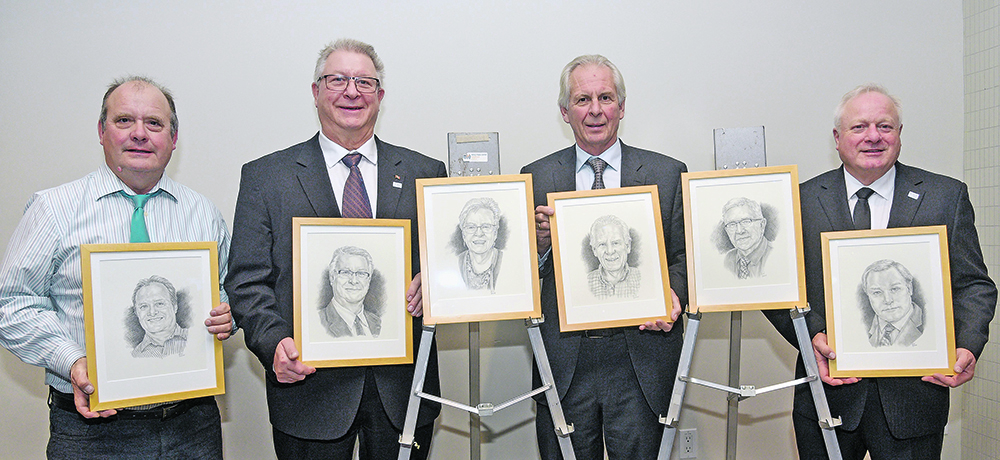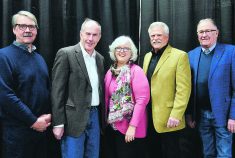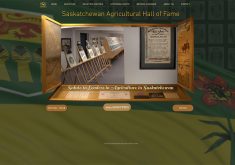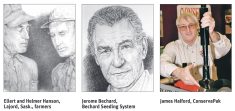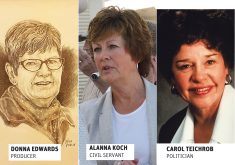The organization was founded as a way to honour those who played key roles in provincial agriculture and rural life
The induction of six new members into the Saskatchewan Agricultural Hall of Fame in Saskatoon Nov. 12 coincided with the organization’s 50th anniversary.
“We are pleased this year to be marking 50 years of celebrating agricultural leaders and innovators, and it is fitting we have such an outstanding group of inductees for the occasion,” said president Reed Andrew.
Since 1972, there have been 271 inductees from the broad agriculture spectrum, each recognized for contributions to the welfare and improvement of Saskatchewan agriculture.
“Over the years we’ve stayed with having a board from all parts of the agriculture industry as it was at the beginning. The Saskatchewan industry nominates worthy candidates and the board selects from the nominations, and this is still the way it is today,” said Andrew.
“There are now 271 inductees in the Saskatchewan Agriculture Hall of Fame made up with one set of brothers inducted together, one couple inducted together, 42 females and 227 males.”
Saskatchewan Lieutenant Governor Russ Mirasty and agriculture minister David Marit addressed the approximately 250 people gathered. They acknowledged the inspirational vision and contributions of inductees.
“We all know that agriculture really is the backbone of the economy of the province of Saskatchewan. We’re known around the world for producing high quality agri-food products. This province is a world leader in sustainability and ag innovation,” said Marit.
Mirasty quoted the late Queen Elizabeth II, who dedicated 70 years of her life to service.
“At the United Nations General Assembly in 2010, she said the following: ‘Over the years I have observed that some attributes of leadership are universal and are often finding ways of encouraging people to continue their efforts, their talents, their insights, their enthusiasm and their inspiration to work together,’ ” he quoted.
“For those we honour tonight and all who have been inducted into the Saskatchewan Agricultural Hall of Fame have done just that — brought people together to work towards common and shared goals.”
Gary Carlson, founder and first president of the hall of fame, attended the ceremonies with his wife Jessie. The professional agrologist served in the position for 10 years from 1972-82.
Following the lead of other provinces, Carlson said he thought it was important to recognize agricultural pioneer leaders.
“I worked for the Saskatchewan Federation of Agriculture at that time and we did most of the preparation for the Hall of Fame’s ceremonies. We grew together a number of organizations and developed a board. Many of those organizations still exist on the Hall of Fame board,” he said.
“But it was certainly a modest beginning.”
The couple remembers visiting with many exceptional trailblazers of agriculture.
“Some of the names at that time were almost giants in the agricultural field,” said Jessie.
However, many of the first inductees were recognized posthumously, including Seager Wheeler, agronomist; James Gardiner, fourth premier of Saskatchewan, and William Motherwell, agriculture minister for both levels of government.
“Most of the early agricultural people recognized were deceased. They (the board) felt it was a new organization and people who were deceased who had given leadership in the distant past had to be recognized first,” said Jessie.
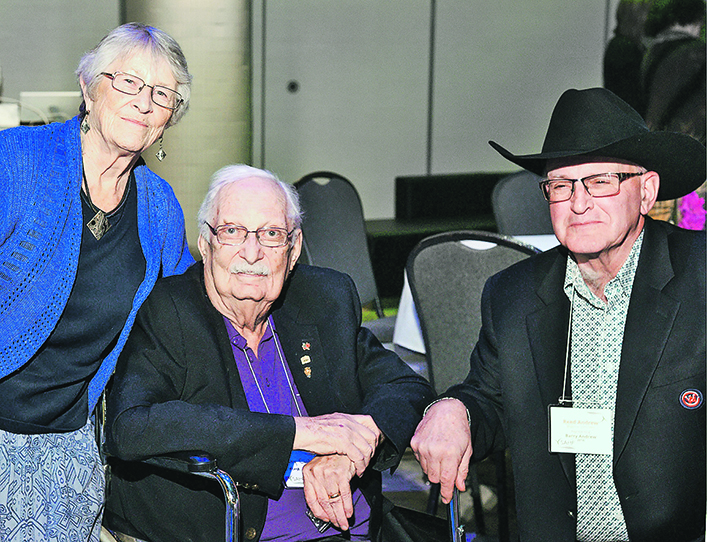
Carlson said he was awestruck as he looked around the room of agricultural leaders, many of whom are past inductees, along with descendants of inductees.
This year’s inductees are leaders in development of canola, extension and home economics, agricultural journalism, ag equipment, research and the bison industry:
- Margaret Crowle died last year. Raised on a farm at Pense, Sask., she participated in a broad range of activities that bettered rural life. Crowle worked as an extension specialist and home economics entrepreneur at the University of Saskatchewan. She helped develop services to support families with financial management and worked with the Consumers’ Association of Canada for more than three decades.
“She was a true champion for women and her profession. Our mom contributed so much to the province of Saskatchewan throughout her life and she truly loved to work and committed herself fully to everything she did,” said daughter Jean.
- Jack Dawes is an agricultural broadcast journalist known for his keen interest in agriculture and his storytelling abilities, most notably during the 1980s and 1990s at CJGX Yorkton. Dawes was the general manager of the Prairie Oat Growers Association from 2003-11 and helped establish the Saskatchewan Oat Development Commission.
Dawes was unable to attend the ceremony and his daughter Natalie spoke on his behalf:
“Other than family, and perhaps music, I haven’t seen Dad as excited about anything like agriculture and especially agriculture farm families. Telling the stories about the men and women working hard on the land in Saskatchewan and across the prairies, and helping the rest of the world understand the importance of farming and the agriculture industry as a whole is Dad’s passion,” she said.
- Leslie Hill was the project manager at the Prairie Agricultural Machinery Institute (PAMI) in Humboldt before retiring. During his 40-year career, Hill helped optimize combine performance and harvest loss reduction. The mechanical engineer had a hand in many improvements that harvest machinery manufacturers implemented in Western Canada.
“I began my career when technology was really starting to become a part of farm machinery as we know it. So, there were a lot of start-ups in the Prairies themselves,” said Hill.
“It’s really an honour to get it, but it’s more about the people that we worked with because we worked as a team for so many years to accomplish a lot of things that were good for the farmers.”
- Mark Silzer has been raising bison for almost 30 years and dedicated to the success of the industry for just as long. He has volunteered thousands of hours to improve the industry, serving the needs of producers and enhancing the bison profile at the local, provincial, national and international levels. He served on the boards of the Saskatchewan and Canadian Bison Associations, including as president and chair of the CBA for 12 years. He is also the second Canadian inducted into the National Buffalo Hall of Fame in the U.S.
“It’s a unique heritage product and certainly we’re starting to see now where (bison meat is) being carried in select grocery stores and restaurants across North America and into Europe. There’s tremendous potential for this industry to grow and for the market to stay ahead of the supply,” Silzer said.
- Jeff Schoenau is a professor of soil fertility and an agrologist in the Department of Soil Sciences at the University of Saskatchewan. Many farmers have benefited from his soil nutrient management solutions for crop and livestock production, while improving soil, water and air quality.
“I’ve been very fortunate to see the development and adoption of conservation management practices here on the Prairies … from the research work that we have done and others, comparing soils that have been archived from those early days to ones that we have analyzed very recently in 2018, that those soils are significantly better than they were back then because of those conservation management practices that farmers have adopted here on the Prairies in the last three decades,” he said.
- Jim Bessel was instrumental in the establishment of canola as a reliable and profitable crop throughout Western Canada and internationally. The agronomist joined the Canola Council of Canada to do work with the Saskatchewan Canola Growers Association, where he collaborated with researchers, equipment manufacturers, seed companies and growers to reduce challenges and provide a positive outcome for growers.
“I work from a perspective of I never apologize for the dirt in my DNA,” said Bessel.
“Working with growers all over Western Canada has been one of my biggest highlights; meeting folks at the kitchen table and dealing with issues from an agronomic perspective, from an engineering perspective, and also how that ties to economics at the bottom end is the key.”


